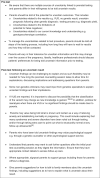Couples experiences of receiving uncertain results following prenatal microarray or exome sequencing: A mixed-methods systematic review
- PMID: 32362033
- PMCID: PMC8425413
- DOI: 10.1002/pd.5729
Couples experiences of receiving uncertain results following prenatal microarray or exome sequencing: A mixed-methods systematic review
Abstract
Background: Tests in pregnancy such as chromosomal microarray analysis and exome sequencing are increasing diagnostic yield for fetal structural anomalies, but have greater potential to result in uncertain findings. This systematic review investigated the experiences of prospective parents about receiving uncertain results from these tests.
Methods: A systematic search of three electronic databases was conducted. Data extraction was performed for studies that met the eligibility and quality criteria. Results were synthesised following the principles of thematic analysis.
Results: Fourteen studies (10 qualitative, 4 quantitative) were included. Findings were grouped into three overarching themes. Sources of uncertainty included the testing procedure, the diagnosis and prognosis, and health professionals' own uncertainty. The clinical impact of the uncertainty included parents struggling to make clinical decisions with the information available, the emotional impact included decisional-regret, shock, worry and feeling overwhelmed. To manage the uncertainty, parents sought support from healthcare professionals, friends, family, the internet and other parents as well as remaining hopeful.
Conclusions: Prospective parents experience a myriad of uncertainties in the prenatal setting, which must be handled sensitively. Future research should explore optimal ways of managing uncertainty to minimise harm. Recommendations are made for discussing uncertainty during pre- and post-test counseling.
© 2020 The Authors. Prenatal Diagnosis published by John Wiley & Sons Ltd.
Conflict of interest statement
The authors declare that they have no conflicts of interest.
Figures
References
-
- Stevenson RE, Hall JG, Everman DB, Solomon BD. Human Malformations and Related Anomalies. 3rd ed.New York: Oxford University Press; 2015.
-
- Ely DM, Driscoll AK. Infant mortality in the United States, 2017: data from the period linked birth/infant death file. Natl Vital Stat Rep. 2019;68(10):1‐19. - PubMed
-
- Boyd PA, Tonks AM, Rankin J, Rounding C, Wellesley D, Draper ES. Monitoring the prenatal detection of structural fetal congenital anomalies in England and Wales: register‐based study. J Med Screen. 2011;18(1):2‐7. - PubMed
-
- Babkina N, Graham JM Jr. New genetic testing in prenatal diagnosis. Semin Fetal Neonatal Med. 2014;19(3):214‐219. - PubMed
-
- Mone F, Quinlan‐Jones E, Kilby MD. Clinical utility of exome sequencing in the prenatal diagnosis of congenital anomalies: a review. Eur J Obstet Gynecol Reprod Biol. 2018;231:19‐24. - PubMed
Publication types
MeSH terms
Grants and funding
LinkOut - more resources
Full Text Sources
Medical
Miscellaneous




